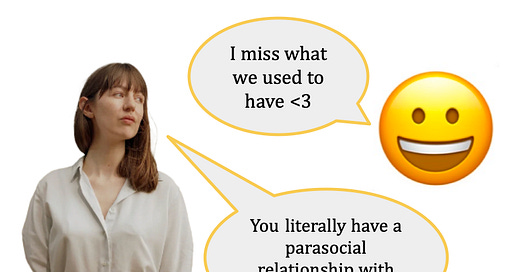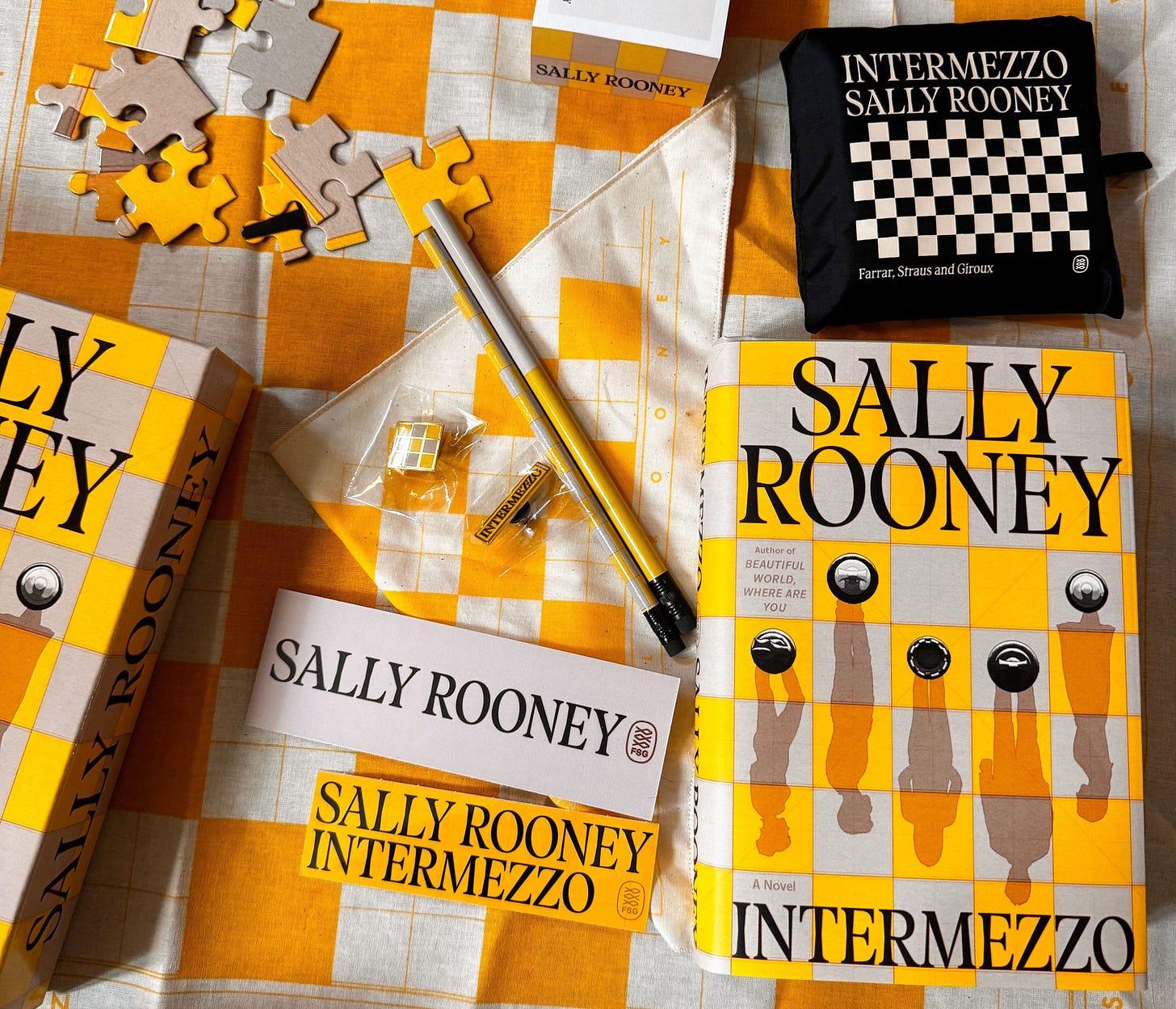I'm Breaking Up With Sally Rooney (and some thoughts on Intermezzo)
In honor of St. Patrick's Day, Women's History Month, and COVID-19
Do you remember what it felt like to watch the Hulu/BBC adaptation of Normal People for the first time?
It was deep pandemic and you were drunk on whipped coffee and Joe Exotic. Time had lost functional meaning and your freshman year of college had come to an abrupt and devastating halt. Chloe Ting this, Zoom school that. Remember to feed your sourdough starter. That rancid “Imagine” video. Everything horrible, everything numb. Another family walk.
And then…in the delirious haze of partial insanity, the hottest Irish people you’ve ever seen appear on your Space Gray MacBook Air in the dark of your childhood bedroom. You wipe Cheez-It grease off your fingertips to discover an Instagram account dedicated to a single silver chain.
They’re your age in the show. They still get to go to college, no masks. They’re sad too, but smart and in love. You finish the show, watch every cast interview you can find, and then you start the show over again.
Happy Five Year COVID anniversary, everyone. It’s time to break up with Sally Rooney.
Sally Rooney is the literary wunderkind of her generation. No one can take that title from her, and no one ever will. Her debut novel Conversations with Friends came out in 2017 to high praise. She was 27 at the time. A year later, the even more well-loved Normal People hit the shelves. Bam! Tens of millions of dollars from a massively successful TV show. Bam! “First great millennial novelist” and “voice of a generation” in every review, profile, and think-piece.
Ignoring everything she’s written, Rooney is still notable unto herself: a literary unicorn, a prodigal star. She comes off in interviews as both too good for her own success and also too ordinary for it. If you’re young and dream of having your own published fiction one day, chances are that your grandest ambitions mirror Rooney’s trajectory.
She studied American literature in Ireland? Was a championship debater in college? A Marxist who gets to be rich? There’s so much to idealize about Sally Rooney that sometimes her books get lost in the discourse. The bucket hats, the launch parties. Indeed, my problem with Sally Rooney is that it’s easiest to appreciate her when I don’t have to read her books.
But Sally Rooney’s a writer and so am I, so let’s talk about Intermezzo. Let’s talk about her “most moving novel yet,” and what happens when you go from being someone with something to prove to someone whose reputation precedes her. Sally, Sally, Sally. What would we all talk about if we didn’t have you?
Intermezzo is about two brothers, Peter and Ivan, navigating the death of their father. Peter is a 32-year-old lawyer with both a longtime companion (Sylvia) and a 23-year-old girlfriend (Naomi). Ivan is 22, a chess prodigy, and dating a 36-year-old woman named Margaret. Their ages matter because most of the book contends with how much their ages matter.
Nothing really happens in Intermezzo. The five main characters have conversations with each other in different permutations. Ivan and Peter reckon with their grief and their own complicated relationship with each other. The characters drink too much and walk around in the sad, Irish rain. Sometimes Margaret will pick up Ivan from a bus stop and that’ll be, like, ten pages. And then that scene will happen again from Ivan’s point of view and that’ll be another ten pages. You get the idea. And it’s a 450-page book.
The narrative style of Intermezzo is crowded and distressed. With Peter especially, Rooney pushes us into his mind using haphazard sentence fragments and self-hatred trapped in passive voice. At lunch with Sylvia, Peter’s thoughts progress like this:
“She was looking at him but he busied himself eating, avoiding her eye. And why. Not wanting. Not wanting not. Pointless to deny of course, not because the other would care, but because she already knew. Still there was something he didn’t like in it. Insisting at last a bit too hard. Admit it, confess, confess. You’re the one who won’t let me touch you, he thought. Then briefly allowed his eyes to close, despising himself” (213).
Or after work one day: “His own failures, mistakes he has made, people he has let down. Self-disgust. Defeat. Making bank transfers while she’s in the shower. Forget about it. Her all-destroying pain. That suit at the funeral. And his father. Final agonies. Inevitability of death. Meaningless existence, false scaffold of morality assembled around nothing. The final permanent nothing that is the only truth” (71).
…yeesh
So the critics and journalists assembled to deign Intermezzo “exquisite” and “utterly perfect,” and…I get it, I guess. Like “false scaffold of morality assembled around nothing” is cool. But it’s also bleak and not actually that poetic.
Everything about this book—from its Irish winter to its long, unindented blocks of margin-to-margin text (truly: multi-page paragraphs) is gloomy and relentless. Romance never lifts the mood because the relationships are their own majors sources of conflict. The characters never come alive because they’re all so suffocated by their own depression. Things can be exquisite, I guess, and also major bummers that I mostly dislike.
And, for what it’s worth, there are better examples of modernism out there. There are stronger depictions of up-close grief. In the opening chapter of Virginia Woolf’s The Waves, Neville hears about a death and contemplates:
“I shall call this stricture, this rigidity, ‘death among the apple trees’ for ever. There were the floating, pale-grey clouds; and the immitigable tree; the implacable tree with its greaved silver bark. The ripple of my life was unavailing. I was unable to pass by. There was an obstacle. ‘I cannot surmount this unintelligible obstacle’, I said. And the others passed on. But we are doomed, all of us, by the apple trees, by the immitigable tree which we cannot pass” (18).
In comparison, Intermezzo’s stream of consciousness strikes me as sloppy and not quite animated with the spirit of being alive. For all the many times that Rooney describes the light during any given scene, the book as a whole feels largely colorless.
Rooney wants us to see the book as some complex, beautiful game of chess—she named the novel Intermezzo for crying out loud—but let’s be honest with ourselves: the plot of this book is dull and predictable. The characters eat meals together and walk around and have conversations. It can still be a good novel, but the story is no elaborate chess match. Maybe the book should’ve been called Really Long Game of Go Fish Played with a Beautiful Deck of Cards.
But the real reason I’m inciting this breakup is because I’m finally ready to admit that I prefer the symbol of Sally Rooney to the books she’s actually writing.
In the beginning of our five-year relationship, Rooney had bite and wit. She was writing shorter, sharper books about being young, anxious, and wanting to make art in an unfair world. Connell’s a writer, Bobbi and Frances both poets; Sally Rooney wrote lucid, hungry novels that reflected her own ambitions. And then…she did it. She became the voice of a generation. Now she’s swapped nimble dialogue for brooding thought spirals, determined creatives for miserable lawyers.
I mean—Shiv read Conversations with Friends on a beach! Shiv Roy. We all got to think about the implications, about what it meant for our literary Marxist icon to write a book so buzzy even the Murdochs might care. Do you remember the think pieces? The “uh oh why is every Rooney character skinny” essays and the “uh oh why is every Rooney character white” essays and the “uh oh how Marxist can Rooney actually be” essays. Do you know what the essays are like now? Fawning. Drab. Referential of the Russian greats and Joyce. It’s all well and good that Rooney wants her critical accolades, but it’s a shame her writing needs to be so lackluster to do it.
Rooney’s early success comprised a cultural moment, a zeitgeist bubble. And at the helm of the ship was this brilliant, articulate woman who believed in love and saw clever books as worthwhile. It was exceptionally inspiring for me to be young, to dream of my own published fiction one day, and to let my grandest ambitions mirror Rooney’s trajectory.
But it’s been five years since COVID, and it’s been five years since that cultural moment. I don’t want to write Sally Rooney novels anymore. I don’t even like to read Sally Rooney novels anymore. And Sally Rooney isn’t a bubble, she’s an author—a very good one, according to many. I’m breaking up with Sally Rooney because I’m ready to admit that I like the idea of Sally Rooney more than I like the work she’s producing, and that’s not fair to her, and it’s not fair to me.
So go forth and read Intermezzo. Read Virginia Woolf or James Joyce. Go write a Sally Rooney novel or, better yet, go write your own! But if you’re at all like me—too critical for mediocre modernism and in search of a new live wire reminiscent of Rooney’s initial ascendance, it might be time to cut your losses in the cult of Sally Rooney.








I feel like the last two rooney books speak to those who are closer to her age, and usually to the oldest character. The same reason conversation with friends and normalpeople resonated with college kids after the tv show, but they were written before, similar to the age of the author. Its like her characters have grown faster than her normal people tv show audience
I loved reading your take on this, and I have to say I do agree in a way. I’m not breaking up with her books. I like them, I think they’re good, they’re exactly the kind of slice-of-life-nothing-big-happens kind of literary fiction novels that I enjoy. But I wrote about the Rooney phenomenon in my 2024 reading wrap up as well. Like you said, the books are good, but I struggle to see how they’re ‘nobody in this genre has ever produced anything like this’ good? I genuinely wonder if Intermezzo was written by an unknown author if everyone would be losing their minds the way they did. People queueing and bookshops opening early etc is just a bit too much for me. Again, I really enjoy her work but I’ve read similar books that I liked just as much.
https://fatforthought.substack.com/p/is-intermezzo-overrated-my-2024-end?r=17yiut